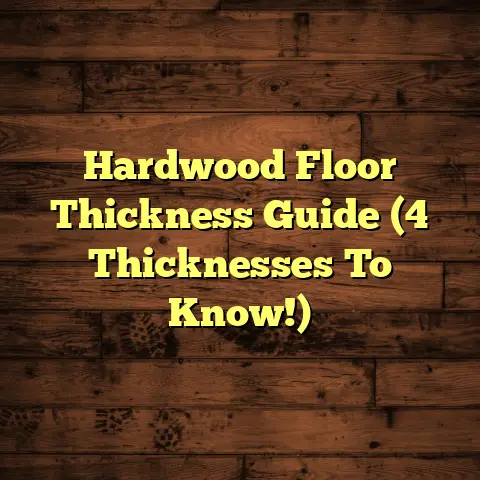Eliminate Pet Odor From Hardwood? (2 Fixes NOW!)
I remember it like it was yesterday. The day we brought home Barnaby, our golden retriever puppy. The house was filled with laughter, the click-clack of his tiny paws on our beautiful, newly refinished hardwood floors.
We were so happy, imagining years of joyful companionship. Ah, naivete! It didn’t take long for reality to bite…or, well, whiff. The initial excitement slowly morphed into a constant battle against the inevitable: pet odors.
You know that moment, right? When you walk into your home and that certain smell hits you? It’s not just “dog smell.” It’s…embedded. It’s like the joy of having Barnaby was being slowly suffocated by the lingering aroma of his less-than-perfect potty habits.
Trust me, I get it. You adore your furry friend, but you also want a home that smells fresh and clean. It’s a tough balance, especially with hardwood floors.
Introduction: Understanding the Problem
Why hardwood? Well, it’s beautiful, durable… and, unfortunately, a bit porous. Think of it like a sponge, slowly absorbing every accident, every dribble, every tiny particle of dander.
Pet odors, especially those from urine, feces, and even dander, are a complex cocktail of organic compounds. These compounds seep into the wood fibers, becoming trapped below the surface.
According to the American Pet Products Association (APPA), pet ownership has surged in recent years. In 2023-2024, 66% of U.S. households own a pet, which equates to 86.9 million homes, a jump from 56% in 1988. (Source: APPA National Pet Owners Survey).
That means more pets, more hardwood floors, and, inevitably, more pet odor problems.
Are you nodding along, thinking, “Yep, that’s my house”? Don’t worry. You’re not alone, and more importantly, there are solutions!
Section 1: The Importance of Addressing Pet Odor
Let’s be honest. Pet odor isn’t just unpleasant; it’s a health hazard. I’m not trying to scare you, but it’s important to understand the risks.
Pet urine, for example, can harbor bacteria like E. coli and Salmonella. Feces, well, I don’t need to elaborate. And even dander can trigger allergies in both humans and pets.
Beyond the physical health risks, there’s the psychological impact. Living in a home that constantly smells like pet accidents can be stressful. It can make you feel self-conscious, especially when guests come over.
I’ve seen it firsthand. Clients embarrassed to invite friends over, constantly apologizing for the “dog smell.” It’s heartbreaking!
Plus, if you’re thinking of selling your home, pet odor is a major turn-off for potential buyers. It can significantly decrease your home’s value.
So, addressing pet odor is about more than just having a nice-smelling house. It’s about protecting your health, your well-being, and your investment.
Section 2: Fix #1 – Deep Cleaning Techniques
Okay, let’s get down to business! The first fix is deep cleaning. This isn’t your regular weekly mopping. This is a targeted, thorough cleaning designed to penetrate the wood fibers and eliminate the source of the odor.
1. Preparation for Deep Cleaning
Before you even think about grabbing a mop, there are a few crucial steps:
-
Remove Furniture: Get everything off the affected area. Rugs, tables, chairs – everything must go. This ensures you can access the entire surface.
-
Vacuum Thoroughly: Use a vacuum with a HEPA filter to remove any loose dirt, debris, and pet hair. Pay extra attention to cracks and crevices where odors tend to accumulate.
-
Assess the Damage: Take a close look at the floor. Can you identify the specific areas where the odor is strongest? These are the spots you’ll need to focus on. A UV flashlight (black light) can be helpful in revealing hidden urine stains.
2. Homemade Cleaning Solutions
I’m a big fan of DIY cleaning solutions, especially for hardwood floors. They’re often safer, more affordable, and just as effective as commercial products. My go-to recipe for pet odor removal is a simple vinegar and water mix.
- Vinegar and Water Mix: Combine equal parts white vinegar and warm water in a spray bottle. For a stronger solution, you can use a 2:1 ratio of vinegar to water.
Why vinegar? Vinegar is a natural deodorizer and disinfectant. Its acidity helps to neutralize alkaline urine stains and kill bacteria. Plus, it’s safe for hardwood floors when diluted properly.
Important Note: Always test any cleaning solution in an inconspicuous area first to ensure it doesn’t damage the finish.
3. Step-by-Step Cleaning Process
Now for the fun part (sort of)! Here’s how to deep clean your hardwood floors using the vinegar and water solution:
-
Spray the Affected Area: Lightly spray the cleaning solution onto the affected area. Don’t saturate the floor. You want it damp, not soaking wet.
-
Let it Sit: Allow the solution to sit for 5-10 minutes. This gives the vinegar time to penetrate the wood fibers and break down the odor-causing compounds.
-
Blot, Don’t Rub: Use a clean, dry cloth to blot the area. Avoid rubbing, as this can damage the finish and spread the odor.
-
Rinse (Optional): If you’re concerned about vinegar residue, you can lightly rinse the area with clean water. Again, use a damp cloth, not a soaking wet mop.
-
Repeat as Needed: For stubborn odors, you may need to repeat the process several times.
4. Drying and Finishing Touches
Drying the floor properly is crucial to prevent water damage and mold growth.
-
Use a Fan: Place a fan near the cleaned area to speed up the drying process.
-
Open Windows: If the weather permits, open windows to improve ventilation.
Once the floor is completely dry, you can add some finishing touches to lock in freshness.
-
Wood-Safe Deodorizer: Consider using a wood-safe deodorizer spray. Look for products specifically designed for hardwood floors and pet odors.
-
Baking Soda: Sprinkle a thin layer of baking soda over the cleaned area and let it sit for a few hours before vacuuming. Baking soda is another natural deodorizer that can help absorb any remaining odors.
Section 3: Fix #2 – Odor Neutralizing Treatments
Sometimes, deep cleaning alone isn’t enough. For particularly stubborn odors, you need to bring in the big guns: odor neutralizing treatments.
1. Commercial Products Overview
There are tons of commercial products on the market that claim to neutralize pet odors. But which ones actually work? Here are a few of my favorites:
-
Enzyme Cleaners: These cleaners contain enzymes that break down the organic compounds in pet urine and feces. Look for products that specifically target pet odors. Brands like Nature’s Miracle and Rocco & Roxie are popular choices.
-
Odor Absorbers: These products contain ingredients like activated charcoal or zeolites that absorb odors from the air and the floor. They’re often available in spray, gel, or powder form.
-
Oxidizing Cleaners: These cleaners use chemicals like hydrogen peroxide to oxidize and neutralize odor- causing molecules. They’re very effective but can be harsh on hardwood floors, so use them with caution.
2. Application Techniques
Applying these products correctly is key to their effectiveness.
-
Read the Label: I can’t stress this enough! Always read the product label carefully and follow the manufacturer’s instructions.
-
Test in an Inconspicuous Area: As with any cleaning solution, test the product in an inconspicuous area first to ensure it doesn’t damage the finish.
-
Apply Liberally: Don’t be shy! Apply the product liberally to the affected area, making sure to saturate the wood fibers.
-
Allow Sufficient Contact Time: Most products require a certain amount of contact time to work effectively. Follow the manufacturer’s instructions for how long to leave the product on the floor.
3. DIY Odor Neutralizers
If you prefer a more natural approach, there are several DIY odor neutralizers you can try.
-
Baking Soda Paste: Mix baking soda with water to form a paste. Apply the paste to the affected area and let it dry completely. Then, vacuum up the residue.
-
Essential Oil Blend: Combine a few drops of your favorite essential oils (like lavender, lemon, or eucalyptus) with water in a spray bottle. Spray the mixture lightly onto the floor.
Important Note: Some essential oils can be toxic to pets, so do your research before using them.
-
Hydrogen Peroxide: Diluted hydrogen peroxide can be used to neutralize pet odors, but it can also lighten the wood, so use it with extreme caution. Test it in an inconspicuous area first and use it sparingly.
4. Long-Term Maintenance
Preventing pet odors from returning is just as important as eliminating them in the first place.
-
Regular Cleaning: Establish a regular cleaning routine that includes vacuuming and mopping with a pet-safe cleaner.
-
Immediate Cleanup: Clean up accidents immediately to prevent the odors from seeping into the wood fibers.
-
Use Rugs and Mats: Place rugs and mats in high-traffic areas to protect the floor from pet accidents.
-
Train Your Pet: If your pet is still having accidents indoors, work with a trainer to address the underlying issue.
Conclusion: Transforming Your Space
Remember that memory I shared at the beginning? The one where the joy of having Barnaby was slowly being suffocated by pet odors? Well, I’m happy to report that we eventually won that battle!
It took some trial and error, some deep cleaning, and some odor neutralizing treatments, but we finally reclaimed our home. And you can too!
Imagine walking into your home and being greeted by the warm, inviting scent of clean hardwood floors, instead of the lingering aroma of pet accidents. Imagine feeling proud to invite friends over, knowing that your house smells fresh and clean.
It’s possible! With a little effort and the right techniques, you can eliminate pet odor from your hardwood floors and enjoy the companionship of your furry friend without the burden of unpleasant smells.
Call-to-Action:
So, what are you waiting for? Try out these solutions today! Share your experiences in the comments below. Do you have any other tips for keeping hardwood floors fresh? I’d love to hear them! Let’s help each other create happy, healthy, and odor-free homes for ourselves and our beloved pets.





